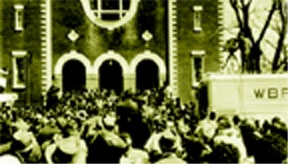

The role of the Black church in the Civil Rights Movement
By Vicki Phipps
The role of the church in every African American community played a major role in the Civil Rights Movement, but the role of the church began long before the revered Reverend, Martin Luther King, Jr. was born. It began with slavery.
African American churches still pray the same way today, with a spirit that comes from deep within the souls of their ancestors, the slaves. Oppression, rejection and segregation leave a human being with no one to turn to, but God. Hope came alive from spiritual songs, which were sung in the heat of southern plantations long ago. Without that old hope, the change to move to Civil Rights could not have come. It was hope that created the churches which were raised by faith, and it was the church that produced Dr. Martin Luther King, Jr. and other leaders of the Civil Rights Movement. It wasn’t about religion, but the spirit of so many souls who remained faithful to hope.
People can only be enslaved for just so long before they find the hope inside to rise up for justice. It took time to do, and we still have far to go, but the Black church produced Elvis Presley just as surely as it did Ray Charles.
Billy Graham came from that same southern heat, and preached from the same side of the pulpit as Martin Luther King, Jr. and through them, it changed our society.
Every time the words were sung from the songs of slavery, We Shall Overcome, it became an act of faith which created the need for change, and because of this, the Civil Rights Movement was destined to take place. The church stood by its leaders with that same hope and faith, which gave Dr. Martin Luther King, Jr. the words that were finally heard with opened minds: “I have been to the mountain top and I’ve seen the other side.”
In post slavery days, the church continued with the quest to civil liberty. In Alabama, The Brown Chapel AME Church played a pivotal role in the southern state marches and led to the passage of the 1965 Voting Rights Act. The church was built by a Black builder named A.J. Farley. Joining other Civil Rights leaders, his head was fractured in what became known as “Bloody Sunday.” The list of those who directly came from the church and changed our country goes on and on.
The Brown Chapel sits on Dr. Martin Luther King, Jr. Street, as the historical monument to the Civil Rights Movement, but how amazing it seems to me that most have never heard of the man who built it. Still, this is just another way the church played a major role in making the American dream come true for everyone, even the unknown souls.
Today the churches in African American communities continue to play its role in changing our society. The church is actively seeking to improve the urban communities and provide safe havens for Black children. They take on the issues of gang violence in the same way they ended slavery, with constant hope and amazing faith.


Be the first to comment